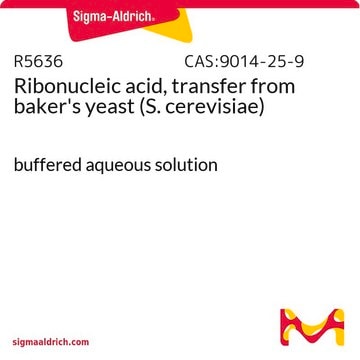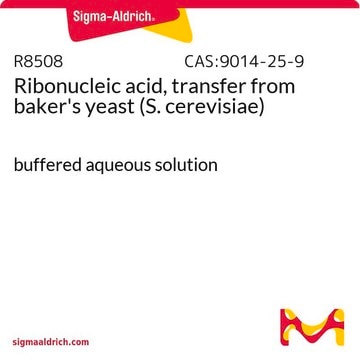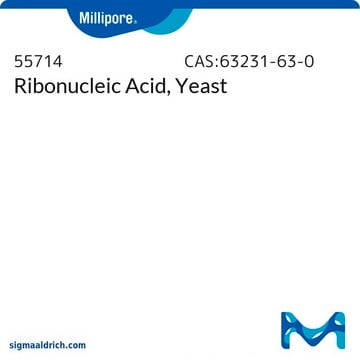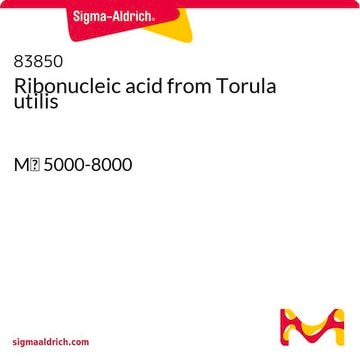R9001
Ribonucleic acid, transfer from baker′s yeast (S. cerevisiae)
Type X, lyophilized powder
Synonym(s):
Transfer RNA, tRNA
Sign Into View Organizational & Contract Pricing
All Photos(1)
About This Item
Recommended Products
grade
for molecular biology
type
Type X
form
lyophilized powder
storage temp.
−20°C
Looking for similar products? Visit Product Comparison Guide
General description
Transfer RNA (tRNA) is isolated from baker′s yeast by phenol-chloroform extraction and ethanol precipitation.
Application
Suitable for use as a carrier in nucleic acid purification and precipitation.
Components
tRNA is provided as a lyophilized powder.
related product
Product No.
Description
Pricing
Storage Class
11 - Combustible Solids
wgk_germany
WGK 3
flash_point_f
Not applicable
flash_point_c
Not applicable
ppe
Eyeshields, Gloves, type N95 (US)
Certificates of Analysis (COA)
Search for Certificates of Analysis (COA) by entering the products Lot/Batch Number. Lot and Batch Numbers can be found on a product’s label following the words ‘Lot’ or ‘Batch’.
Already Own This Product?
Find documentation for the products that you have recently purchased in the Document Library.
Customers Also Viewed
Christophe Maris et al.
Nucleic acids research, 48(8), 4521-4537 (2020-03-15)
The polypyrimidine tract binding protein (PTB) is a multi-domain protein involved in alternative splicing, mRNA localization, stabilization, polyadenylation and translation initiation from internal ribosome entry sites (IRES). In this latter process, PTB promotes viral translation by interacting extensively with complex
A simplified method for combined immunohistochemistry and in-situ hybridization in fresh-frozen, cryocut mouse brain sections.
Newton, S.S., et al.
Brain Res. Protoc., 9, 214-214 (2002)
Mammalian in vitro splicing assays.
A Mayeda et al.
Methods in molecular biology (Clifton, N.J.), 118, 315-321 (1999-11-05)
Rahul Sharma et al.
STAR protocols, 1(1), 100006-100006 (2020-10-29)
DNA-FISH remains the method of choice to visualize genomic regions in situ ranging from a single locus to entire chromosomes. Current methods to generate probes rely on expensive kits that vary in labeling efficiency and are limited by the size
Fu-Jung Lin et al.
PLoS genetics, 9(5), e1003516-e1003516 (2013-05-30)
Mouse Ikbkap gene encodes IKAP--one of the core subunits of Elongator--and is thought to be involved in transcription. However, the biological function of IKAP, particularly within the context of an animal model, remains poorly characterized. We used a loss-of-function approach
Our team of scientists has experience in all areas of research including Life Science, Material Science, Chemical Synthesis, Chromatography, Analytical and many others.
Contact Technical Service











